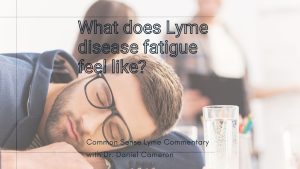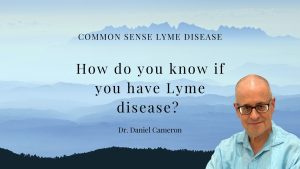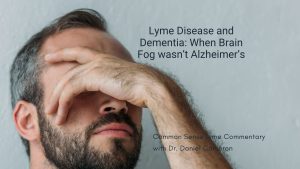
According to Rebman and colleagues, writing in the journal Frontiers in Medicine, PTLDS is a severe complication of Lyme disease. [1] The authors identified PTLDS using the Infectious Diseases Society of America (IDSA) proposed case definition. [2] “Briefly, this definition relies on prior physician-documented Lyme disease, treatment with standard of care antibiotics, and the development of significant fatigue, widespread musculoskeletal pain, and/or cognitive difficulties that last for a period of at least 6 months, and began within 6 months of a Lyme diagnosis and recommended treatment,” explains Rebman.
Individuals with PTLDS represent a group of patients who have been evaluated for “unexplained fatigue, pain, and neurocognitive symptoms by primary care and sub-specialty physicians,” the authors state. These patients are “highly and clinically significantly symptomatic, with poor health-related quality of life.”
“Nearly 60% of patients with post-treatment Lyme disease syndrome had a delay in diagnosis or initial misdiagnosis. “
“PTLDS patients,” Rebman states, “exhibited levels of fatigue, musculoskeletal pain, sleep disturbance, and depression which were both clinically relevant and statistically significantly higher than controls.”

According to the study findings, PTLDS can last for years. “Our cohort was a median of 3.6 years from onset of PTLDS symptoms to study enrollment, with a range of 8.3 months to 27.7 years,” states Rebman.
And, PTLDS can occur even in Lyme disease patients treated within 30 days of the onset of symptoms. “Time from illness onset to first recommended course of antibiotic treatment was a median of 30 days,” according to Rebman.
Additionally, 59% of the patients with PTLDS reported having a delay in diagnosis or an initial misdiagnosis. Risk factors for PTLDS include a delay in diagnosis and an increased severity of initial illness, including the presence of neurologic symptoms.
The authors did not address other manifestations including chronic neurologic Lyme disease [3] and neuropsychiatric Lyme disease. [4]
The Johns Hopkins study should put to rest the false narrative perpetuated by the 2006 IDSA treatment guidelines which states, “In many patients, post-treatment symptoms appear to be more related to the aches and pains of daily living rather than to either Lyme disease or a tick-borne co-infection.” [2]
Related Articles:
Case report: persistent pain and fatigue after treatment for Lyme disease
Johns Hopkins’ study supports early identification of Lyme disease patients for re-treatment
At least 50% of patients with Lyme neuroborreliosis remain ill years after treatment
References:
- Rebman AW, Bechtold KT, Yang T, et al. The Clinical, Symptom, and Quality-of-Life Characterization of a Well-Defined Group of Patients with Posttreatment Lyme Disease Syndrome. Front Med (Lausanne). 2017;4:224.
- Wormser GP, Dattwyler RJ, Shapiro ED, et al. The clinical assessment, treatment, and prevention of lyme disease, human granulocytic anaplasmosis, and babesiosis: clinical practice guidelines by the Infectious Diseases Society of America. Clin Infect Dis. 2006;43(9):1089-1134.
- Logigian EL, Kaplan RF, Steere AC. Chronic neurologic manifestations of Lyme disease. N Engl J Med. 1990;323(21):1438-1444.
- Fallon BA, Nields JA. Lyme disease: a neuropsychiatric illness. Am J Psychiatry. 1994;151(11):1571-1583.



The Rebman study should add great weight and further credibility to the appropriate diagnosis and treatment of PTLDS. The study stands on the shoulders of giants, the scientists and healthcare providers who steadfastly truly listened to their patients. No, the earth is not flat, you agreed, and helped us navigate a path to health. The Rehman article should be sent to all healthcare insurance carriers, and every neurologist and infectious disease specialist and primary care physician.
The study confirms the severity of a chronic manifestation of Lyme disease.
https://www.sciencedaily.com/releases/2017/12/171213143613.htm
Hey Dr. Cameron, I was diagnosed with Lyme disease radiculinitess in April 2021 and was put on doxycycline for 21 days. The symptoms I was experiencing consisted of pins in needles in all four extremities, awful fatigue, muscle twitching, restless legs, slight spinal pain, and in one episode I had became so dizzy I had to pull over driving. After my 21 days on the antibiotics all symptoms were resolved other then my muscle twitching however it substantially resolved. Now this is where it gets fun, my muscle twitching picked up again around end of august and I had started to feel spinal pain again, I also had another episode of dizziness and had to actually leave the baseball game I was at since it was so severe. Muscle twitches had never stopped and now for the past month I’d say I’ve noticed my words slurring together sometimes, I forget where I put things and sometimes I even forget to turn my car off. These memory things are very short term and I realize I’ve done it within the minute it almost feels like it’s a fog, I have trouble finding words sometimes, my mood has been on and off I find myself more irritable. My legs have slightly become restless again, I have lower back pain , I’ve noticed my previous case of slight scoliosis is now noticeable to an extent, I also feel my heart flutter here and there. My final symptom I have is hand tremors here and there. I am only 18 so I understand motor neuron diseases are still possible but not likely and before originally being diagnosed with Lyme I’ve seen a neurosurgeon, and neurologist due to my symptoms and they said it was most likely Lyme as well. I have set up an appointment to see my Lyme specialist already but I was just curious what you’re thoughts are about this case and if it fits the criteria of ptlds or something else?
I have patients with the same unresolved issues. I am glad you reached out to a neurologist and neurosurgeon. I also look a second time for Lyme disease and coinfections in my patients with similar presentations.
Hey Dr. Cameron, I was diagnosed with Lyme disease radiculinitess in April 2021 and was put on doxycycline for 21 days. The symptoms I was experiencing consisted of pins in needles in all four extremities, awful fatigue, muscle twitching, restless legs, slight spinal pain, and in one episode I had became so dizzy I had to pull over driving. After my 21 days on the antibiotics all symptoms were resolved other then my muscle twitching however it substantially resolved. Now this is where it gets fun, my muscle twitching picked up again around end of august and I had started to feel spinal pain again, I also had another episode of dizziness and had to actually leave the baseball game I was at since it was so severe. Muscle twitches had never stopped and now for the past month I’d say I’ve noticed my words slurring together sometimes, I forget where I put things and sometimes I even forget to turn my car off. These memory things are very short term and I realize I’ve done it within the minute it almost feels like it’s a fog, I have trouble finding words sometimes, my mood has been on and off I find myself more irritable. My legs have slightly become restless again, I have lower back pain , I’ve noticed my previous case of slight scoliosis is now noticeable to an extent, I also feel my heart flutter here and there. My final symptom I have is hand tremors here and there. I am only 18 so I understand motor neuron diseases are still possible but not likely and before originally being diagnosed with Lyme I’ve seen a neurosurgeon, and neurologist due to my symptoms and they said it was most likely Lyme as well. I have set up an appointment to see my Lyme specialist already but I was just curious what you’re thoughts are about this case and if it fits the criteria of ptlds or something else?
I have patients with the same unresolved issues. I am glad you reached out to a neurologist and neurosurgeon. I also look a second time for Lyme disease and coinfections in my patients with similar presentations.
while I am pleased with the conclusions….in the Lyme community this has been the conventional wisdom for 5+ years, and it concerns me as to how slowly the traditional scientists r responding to the Lyme pandemic
This great news now I can tell my doctors that my aches and pains are not because I am getting old. I am still sick. When I talk to people I tell them I still have lyme and will live with it the rest of my life. My life dream is to wake up and have the energy to get through the day. Its not happening.
Show your doctor’s this:
https://www.sciencedaily.com/releases/2017/12/171213143613.htm
Uh boy.
So sad that we can’t make headway and are being obstructed at every turn. A relative was in front of congress with Ted Kennedy in the 70″s(I read the transcript) and we’re still fighting for recognition of chronic lyme?????
https://www.sciencedaily.com/releases/2017/12/171213143613.htm
This is not good.
Chronic infection almost certainly the case in 90%+.
The protocol is ineffective.
Spirochetosis is suspected as a cause of neurologic dysfunction.
Etc.
I was misdiagnosed for 5.5 years and treated for approximately 1.5 years with both oral and IV antibiotics. Still, I experience crippling full body arthritis that is confirmed not to be any of the myriad standard types of arthritis (rheumatoid, etc.). While reassuring that the medical community is finally validating what so many of us believe to be true, that the continuing symptoms are horrid and actually exist, there is far too little discussion on what can be done about it. Whether chronic illness or some seemingly inexplicable secondary autoimmune disorder, patients don’t really care what it is as long as it’s treated and relief is given. What are we supposed to do about these ongoing symptoms?
The post-treatment Lyme disease syndrome cases in the Hopkins study were typically treated with 3 weeks of doxycycline at the time of an erythema migrans rash. Persistent infection is one of the proposed mechanisms. Your story highlights the more complicated problem of whether a persistent infection might remain. For example, was treatment for Babesia considered? Of course, it important to rule out other illnsses.
I am sick since October 17 or 18 1992. Misdiagnosed for four years. Put on high doses of IV steroids for Chrohn’s disease that was wrongly diagnosed. My neurological symptoms got 100X worse with those steroids and I feel that has ruined my life! I feel like lyme is still alive in me even though I just had lyme culture test come back negative. Neck cracking and headache so bad today can’t drive.
Can’t tolerate light or loud sound. On couch again this beautiful day. Not sure what or where to go. Don’t know how much more of this I can take. Thank you
It is frustrating when the laboratory tests for Lyme and tick borne illnesses are not as reliable as we would like. It is always difficult to know whether to treat if you have to rely on clinical judgement. You also have to make sure another illness does not play a role.
My super athletic and healthy 23 year old son was hospitalized for 4 days with what finally turned out to be Lyme . Fever, “ worst headache of his life”, vomiting profusely at night only , and then facial palsy. Spinal tap showed ICP of 34. 3 weeks of doxy and acetazolamide and he was the same ( no fever or vomiting but head pain and the joint pain was now everywhere, and recurring facial palsy). No follow up for 6 weeks with Neuro , they “ just couldn’t get him in”. A friend called in a favor to chief of neurology, who saw him yesterday and today he is seeing a Lyme specialist . This whole ordeal has been so frustrating !! One neurology resident told me he couldn’t have Lyme because “ 100% of Lyme cases have the bulls eye rash and he didn’t”! I’m an RN, as is my husband. I am dead serious that is what he said! Another Neuro resident told me he had idiopathic intercranial hypertension until I reminded her of the fever, joint pain and weird rashes popping up all over his body. I’m so frustrated by the lack of knowledge of Lyme among neurology ( who insists they get to follow him due to Elevated ICP). And I’m frustrated that nearly 5 weeks in we are just hearing that our hospital has a Lyme specialist. We live in New Hampshire and have a ton of Lyme cases, how can the medical profession be this ignorant??!
I am sorry to hear your son is having so many issues. You are asking the right questions.
Mis-diagnosed for 3-4 years. Finally $2000 worth of blood screening determined it was lyme all along. Over the past year have done 4 separate ab’s (three were doxy) and am taking high doses of neurontin. I feel worse now than ever. Mowing the yard (which I used to enjoy), wipes me out for the rest of the day. Might try cbd. Anyway, the problem I’ve run into, is that lyme in this country, while affecting many, is somewhat geographically isolated. I live in the south, and have had numerous people in the medical field here blatantly tell me that, because it’s rare in the south, why put any resources towards it at all? What I’m saying that there seems to be more than a few in the field that don’t do anything about it because it’s not in their best interest.
I was recently diagnosed with post-Lyme disease syndrome after suffering from all the classic symptoms for 10 days (April 2020) that came on acutely and were not subsiding. I specifically requested that I be tested for Lyme, which seemed odd to my PCP because I am currently NOT in at my primary residence in PA. I’ve been in NC since Dec 2019. After other blood tests came back “normal,” the Lyme test came back positive for IgG, indicating a past infection. I was surprised by this since, although most of my family and friends had been treated fro Lyme, I never pulled a tick off myself, nor had I recalled ever experiencing the symptoms of Lyme infection. I was told that I have post-Lyme disease syndrome and that even though my immune system successfully destroyed the spirochete, my own antibodies triggered an “immune response” and caused my debilitating symptoms. I was told that there is no treatment since I no longer had the bacteria in my system (logical) but that the syndrome would have to run its course and may appear again in the future, although I would NOT get reinfected. I’m concerned about two things. 1. Why can’t I become reinfected by another tick bite? Can this syndrome be transient and return in the future?
Thank you,
NS
You are asking the right questions. Call my office at 914 666 4665 if you have any questions.
Hi, I have a question about Lyme disease. About a month ago, I had a tick biting. After two days My joint (near to the waist) leg has pain and now the region is numb. I searched on the internet that this is the peripheral neuropathy due to Lyme disease. So, what can I do for this problem? Is there any drug for the curring?
You should see your doctor. I include Lyme disease and other tick-borne infections in my patients. I find these symptoms typically clear with antibiotic treatment. Call my office on Monday at 914 666 4665 if you need any help.
I went to the doctor in March 2020 with a tick still partitally visible in my arm with a three inch ring around the bite and a rash all over my arm. The doctor from upstate NY said it was Lyme, brought in nurses to show them what it looked like and watched him dig out the rest of the tick. I was on doxy for 21 days but six months later I still have terrible dizziness and brain fog, fatigue, not my same personality. I went back, he gave me blood tests and said since they are negative, I have never had Lyme, even though he was adamant I did, and something else is going on. How ironic would another disease show up at that exact time of a tick bite with the bulls eye, rash and typical Lyme symptoms? What do I do now? Could it be a false negative test? If a brain MRI shows something, would it be specific to Lyme?
The tests can be negative after treatment for Lyme disease. A third of well documented Lyme disease patients are ill on long term followup. The MRI can show white spots in Lyme disease but they are also seen in other diseases ie multiple sclerosis, migraines, and depression.
Your doctor would have to make a clinical judgment. Call my office at 914 666 4665 if you have any questions.
People that have been through what you are dealing with can certainly understand the frustration we all have dealt with.
Regular doctors know little to nothing about Lyme, nor anything about treating it. This of course is a big problem for the infected person. You don’t know it could be Lyme yet.
Normal blood tests that doctors use, and including the Mayo Clinic will show no virus, and will come back negative. These doctors are also reluctant to send you to a known Lyme Specialist as well.
What to do? There’s only one way that I personally trust (but not baring others that may exist). That is to find the closest Lyme Specialist to your location, and ask questions on how they would treat you should your test come back positive.
I was sick for more than 20 years (incredibly sick). I tell you this so that you can have hope for getting better. After all that time of spending all my money on one doctor to the next, I happened on a web site that listed most of the symptoms that I had, and explained that it could be the Lyme disease.
At that point, my girlfriend found a great doctor that deals with only this and Fibromyalgia. Her name is Dr. Patricia Salvato, in Houston Texas. She did not stick me on the mindless 30 day routine of one antibiotic, and call it good.
Her method was first to take blood and send it for a test to one particular lab located in California, I think.
It was positive, so the next step was to put me on a rotation of 3 antibiotics. Doxy-Cycl Hycl was one. It has been about 8 or 9 years, so I can’t recall the other two.
I won’t get into the reasons she did it this way, but it was a method of outsmarting the virus. Depending on your severity, the program could last a while until your tests come back negative. You get a blood test after going thru one rotation. So, you may end up having at least three.
In my case it took a year of treatment to get negative. I was feeling slowly better over that year of treatment. After it was all over I was able to do things that I hadn’t been able to in years. My test had no markers that indicated that the virus was still there.
Yet, some of the problems never really went away. The term (PTLDS), that many like myself live with is given a nod in most circles. But I’ve dealt with it for the past 8+ years, and it doesn’t look like it’s ever going away. If only there was an effective treatment for brain fog, I would dance around the moon.
If you have not been infected for too long, you may not have to suffer with PTLDS. It most often is the chronic state of the disease that brings you to that. So, take heart there.
It’s worth the effort finding just the right doctor that has worked with Lyme enough to understand the phantom tactics the virus is so good at.
I wish you success in getting the right doctor, while saving yourself years and a lot of pain and money by not going to MDs that pump antidepressants for your imagery syndrome.
I also had a negative lyme result even though I had the rash and the bite mark. Still suffering from fatigue and brain fog for over 2 years. Just keep going, day by day. There is no current cure.
It is not clear from your comments as to whether you have been treated.
I was eventually treated for Lyme 12 years ago after being very sick as a teen. We didn’t find a bite or rash but I tested positive. Since my symptoms persisted, I received multiple rounds of 28 day doxy until another doctor tested me again and told me I was treated. Nothing has changed since. I’m 26 and have frequent flair ups of muscle pain, joint pain and swelling, headaches, fatigue, nerve hypersensitivity, insomnia, restless legs, and brain fog. I don’t think it’s normal to feel this way at my age but it’s been nearly half my life so I don’t know. I have an active job and still push through when I’m like this. Sometimes I feel pretty okay. I’ve ended up at OSS and physical therapy with a diagnosis of a slight scoliosis only. Who am I supposed to see who will take me seriously that these symptoms are connected?
I typically treat try a different antibiotic for Lyme disease if doxycycline fails in my patients. I sometimes find treatment for Babesia even the test are negative. I also refer to specialist to rule out other illnesses. Call my office at 914 666 4665 if you have any questions.
I was bitten by a tick in May of 2004 I had the bullseye rash and I had tested positive for the Borrelia Burgdorferi. The problem is that I was given amoxicillin 250 mg and a steroid cream to use for a month because I was pregnant at 5 months, so I don’t know if it actually worked or not because there were no other blood test done that I can find. After I left the military I started to experience joint pain, headaches, arthritis, dizziness and stiffness all over my body since 2006. The problem is that now trying to get the doctors to take me serious about how I am stiff all over and how all my joints hurt every morning when I wake up thank you for letting me know about this article PTLDS because it helps clear up a lot of more understanding to what is happening to me. Do you have any advice for me on how to continue on now to help myself get better?
I advise my patients to see a doctor familiar with treating chronic manifestations of Lyme disease rather than dismissing the problem as Post Treatment Lyme disease Syndrome (PTLDS).
I have had paresthesia for past 2 years following a dental filling. Possible tick exposure also. Lyme test was negative. 93 band on western blot. Treated with 28 days of doxycycline and then diclofenac sodium. B12 dropped in 5 month period. Vitamin D low also. Treated with B12 injections and vitamin D. Rashes and other symptoms.
I had lyme disease in 1996-tick bite-bulls-eye rash documented and positive lyme test. I was treated with 21 days of doxycycline. Within 4 months had neurological symptoms. 5 months later-flu-like symptoms and others. No treatment as late stage IGG negative and only a few bands on western blot.
Concerned of progression of nerve pain symptoms and no treatment. Only prescribed gabapentin-not resolving symptoms.
I have Lyme disease patients who have not resolved their symptoms within 3 weeks. Up to one in three individuals with Lyme disease remain ill on long term followup in some studies. I find it useful in some individuals to look at Lyme disease again.
Hi 🙂 I was living in Germany and i was 7 years old when i got diagnosed with Lyme Disease. They couldn’t find a bite, i had no bullseye rash either, however there was two small bumps in my ear. Anyways, i developed bell’s palsy in the left side of my face and got taken to the hospital, the lymes disease affected my nervous system. i was on antibiotics for a long time, and had eye drops. My face still has parts which can’t function properly and i can’t wink with the left eye without my whole face moving . anyways i’m 18 now and i suffer with back pains and spasms quite often, but not sure if it’s for anxiety or not. i also get numbness in my legs / feet sometimes. I’ve suffered with insomnia quite a bit, all symptoms of Post Treatmeant LD, but i’m not sure if i can have it since it’s been 11 years. if anyone knows what i can do or what i can say to the doctors , i’d really appreciate it, sorry for rambling 🙂
Dr. Cameron, thank you so much for this information. I had Lyme Meningitis two years ago. I had horrible back pain for four days before being admitted into the hospital for eight days. I was also in quarantine due to another bacteria they found after the spinal tap. I was put on ceftriaxone for four weeks. My upper spine becomes painful and both arms will still go numb either after sleep or after doing work such as painting or lifting heavy objects. I’ve had many days of horrible fatigue, brain fog, poor concentration, low grade fever with the same painful location in my throat, beginning to see light colored objects in side view when nothing is there. A recent MRI showed scattered punctate foci of T2 signal hyperintensity within the periventricular and subcortical white matter. My GP wants to put me on statins, he doesn’t believe in chronic Lyme disease and won’t give me a referral for a 2nd opinion. I’ve had a very painful autoimmune disorder since I my mid teens; I’ll be 60 on 10/30. And I’ve had insomnia for 29 years now, which is just about the same time I developed chronic fatigue syndrome; which was no where near the fatigue I have now, and I’ve had strange rashes on my next for at least seven years, the same place it was when I had the meningitis. I’m in Central New York, where Lyme is an epidemic but is rarely talked about by doctors. Do you believe that Lyme can be in our body for many years before it can cause something as severe as Lyme Meningitis? Thank you.
Meningitis is typically seen in early disease. I have patients who have been reinfected.
Dr. Cameron, thank you so much for this information. I had Lyme Meningitis two years ago. I had horrible back pain for four days before being admitted into the hospital for eight days. I was also in quarantine due to another bacteria they found after the spinal tap. I was put on ceftriaxone for four weeks. My upper spine becomes painful and both arms will still go numb either after sleep or after doing work such as painting or lifting heavy objects. I’ve had many days of horrible fatigue, brain fog, poor concentration, low grade fever with the same painful location in my throat, beginning to see light colored objects in side view when nothing is there. A recent MRI showed scattered punctate foci of T2 signal hyperintensity within the periventricular and subcortical white matter. My GP wants to put me on statins, he doesn’t believe in chronic Lyme disease and won’t give me a referral for a 2nd opinion. I’ve had a very painful autoimmune disorder since I my mid teens; I’ll be 60 on 10/30. And I’ve had insomnia for 29 years now, which is just about the same time I developed chronic fatigue syndrome; which was no where near the fatigue I have now, and I’ve had strange rashes on my next for at least seven years, the same place it was when I had the meningitis. I’m in Central New York, where Lyme is an epidemic but is rarely talked about by doctors. Do you believe that Lyme can be in our body for many years before it can cause something as severe as Lyme Meningitis? Thank you.
Great to hear that my post symptoms are not crazy. They are real. Of course I pray we all can get a treatment soon.
I have spent so much time and money exploring treatments…Im spent emotionally and financially.
Thank you for sharing!
I tested positive for Lyme at 3 years old and am now 24. My whole life I’ve been abnormally fatigued. I tire easily and suffer from depression and anxiety as well as memory problems, “fog” and body pains. Is it possible for this to still be causing me problems or should it have gone away by now.
There are an increasing number of doctors who agree that 10 to 20% of individuals with Lyme disease remain ill for months to years. Doctors are divided on whether to treat. I am a member of a group that might consider re-treatment.
This is a much needed article. My 77year old husband had a Lymes disease diagnosis in mid June ‘’22. He is exhibiting really strange symptoms that I have suspected were related to his initial Lymes Disease. He is very lethargic, has chronic fatigue and lethargy, he struggles to understand many statements( brain fog?), displays no interest in activities he loves (gardening, hunting, fishing,etc). He has a poor quality of life at this point. I was thinking he was developing dementia. I plan to Pursue this with his PCP, but I do not believe they will accept my suggestion. Thank you.
I hope it works out. All the best.